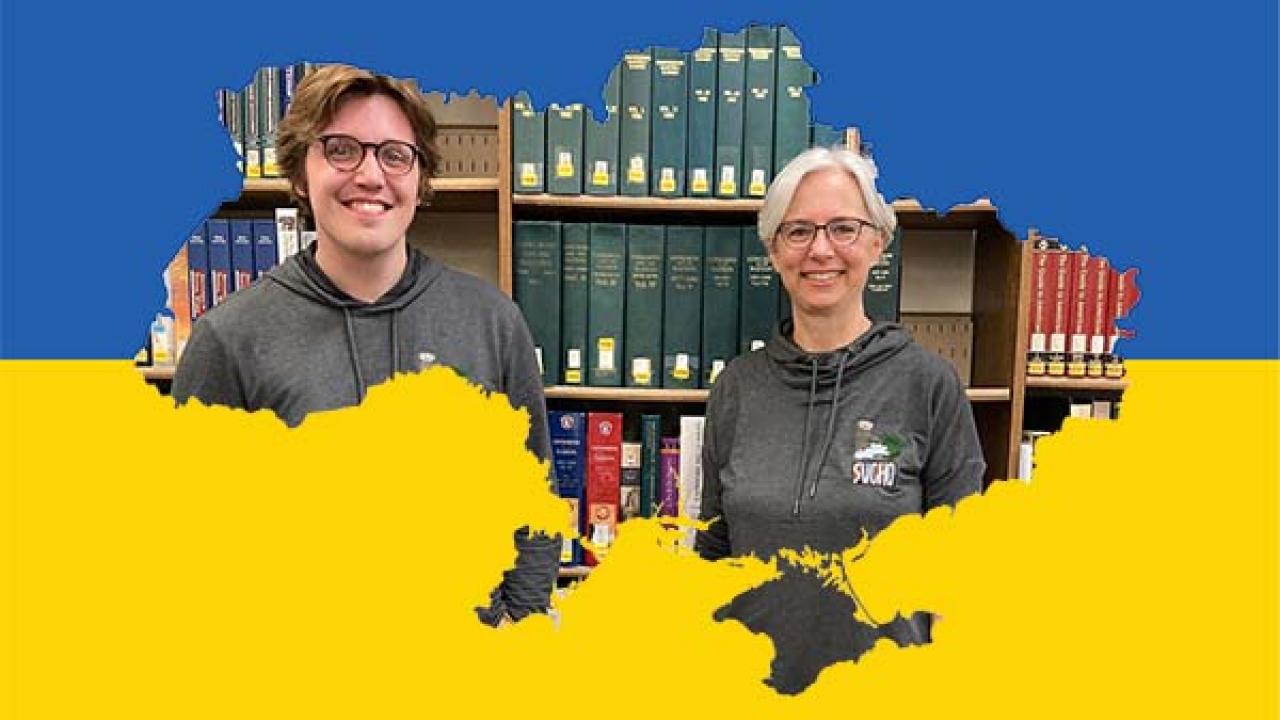“We both have a desire to do something for Ukraine and we were both very troubled by the reporting we were seeing and wanted to help in some way,” said Zach Walton, reference librarian. “We can't be in Ukraine and this was a good option to actually do something virtually, something we could actually just do from our desks that could help. with the hopes that maybe there wouldn't be a need for doing it.”
SUCHO is a group of 1,300 cultural heritage professionals such as librarians, archivists, researchers and programmers, who are working together to identify and archive at-risk web sites, digital content and data. To date, the group’s website reports that the all-volunteer group has preserved more than 50 terabytes of materials from more than 5,000 websites.
“The invasion of the country makes it an urgent need. Ukraine has actually had a wonderful history of digitizing materials and making things available online, but a lot of those materials are hosted in Ukraine and so when a country is invaded, that puts them in danger and at risk,” said Tina Schneider, director of the Lima Campus Library. “This is an effort to make materials safer for the time being so that when the time comes that they are ready to restore their services and their libraries and museums, they can simply roll out the materials that they had at the time that they stopped.”
For the most part, Walton and Schneider have been batch loading thousands of links at a time into the Internet Archive’s Way Back Machine and capturing webistes using an open-source software suite called Web Recorder. They have dealt with everything from checking new web links for malware, to manually recording 3D tours to helping to decide which sites get priority on the massive Google-sheet list that keeps the whole group on track.
One of Schneider’s priorities recently has been the websites of UNESCO’s World Heritage Sites that have been physically damaged. While Schneider started out working largely in the Internet Archive area, her curiosity has recently led her to the situation monitoring section, which sounds straight off the script of NCIS, but isn’t really. This section keeps track of which areas in Ukraine are most at risk as the war changes and moves.
“Situation monitoring has to do with prioritizing sites and figuring out what hasn't been done that we need to do,” she said.
The SUCHO group is archiving all sorts of items of cultural significance, including 3D tours of museums and theatres, art galleries and streetscapes that aren’t standing anymore. Their and other efforts within SUCHO do not impact the live sites. It is almost like they are making a clone. Sometimes when the dust settles, the archived copy is all that is left of the site.
“What's often happened is that whether we store a site on the Internet Archive or with Browsertrix, sometimes that site goes down afterwards,” Schneider said. “We've seen that happen a lot for whatever reason related to the war, so sometimes that is the only copy of the website that survives.”
Sadly, the librarians expect that now that they have the skills they will be involved in similar efforts in the future.
“These types of efforts are going to spread. I imagine we will be involved in some way or the other with future projects of this nature, but this is the first time that archivists and librarians and programmers have concentrated on a crisis situation like this in digital format,” Schneider said.
Schneider and Walton will teach a class for the Student Success Series in September to help students develop the skills to archive, preserve and protect things that are important to them. Strong skills in archiving, language or programming are not necessary to be effective, but the drive and desire to help are.
“What I would want students to take away is that like, for example, I can read five words of Ukrainian right now, but I can still preserve a site. I don't have to know how to read the site in order to save it. Or if somebody says, ‘This site is important, please save it.’ Can do,” Schneider said.
Helpful links
Members of the public are invited to attend the Student Success program that will teach the skills to archive and preserve digital items important to the user that may otherwise be lost. The skills are applicable across many areas and the threat does not have to be as drastic as bombs and international hackers.
“You can do this for anything that interests you or concerns you. A lot of local history would certainly be of interest,” Schneider said.
12:45 p.m., Monday, September 26, 2022, in the Lima Campus Library Special Collections Room
Learn more about Digital Activism: Preserving the Past in the Face of War
Meet the Ohio State Lima sources

Tina Schneider is the director of the Lima Campus Library and a professor with the University Libraries.

Zach Walton is the reference librarian at the Lima Campus Library.
